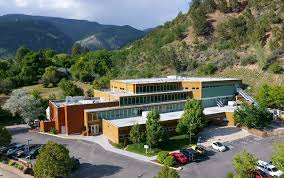The Colorado Mountain College (CMC) Board of Trustees met at CMC’s Morgridge Commons in Glenwood Springs Dec. 12-13 for its regularly scheduled board meeting. The two-day meeting included the annual Joint Boards Meeting between the CMC Board of Trustees and the Colorado Mountain College Foundation Board of Directors.

Colorado Mountain College-Glenwood Springs campus. Photo courtesy CMC
During the meetings, CMC staff updated the boards on a number of significant developments at the college.
- The Moffat County Affiliated Junior College District Board has formally submitted a request for CMC to conduct a study concerning the feasibility of Moffat County’s annexation into the Colorado Mountain College District. This action is the first step in CMC’s procedure to consider modifications to the district’s geographic boundary.
“The Moffat County college district board’s application begins a well-established and complex process to evaluate whether bringing a new community into the CMC district is feasible and in everyone’s best interest,” said CMC Board of Trustees President Peg Portscheller. “We have received several such requests over the past decade; only the communities of Salida and Poncha Springs have successfully joined the district in recent years.”
After completion of a feasibility study, the CMC Board of Trustees will evaluate whether to put the annexation to a vote. Majorities of electors in both the CMC District and the Moffat County Affiliated Junior College District would have to approve annexation in order for Moffat County to join the CMC District. This process is permitted under existing state law and can take several years to complete.
- Also at CMC’s December meeting, trustees agreed to adjust the college’s mill levy slightly to maintain tax revenue that would have been lost due to changes in statewide property tax assessment rates enacted by the legislature.
This year Senate Bill 21-293 takes effect, which reduces statewide property tax assessment for residential, renewable energy and agricultural properties. To offset this change according to the requirements of existing law, trustees voted to raise CMC’s mill levy by approximately 1.8 percent to 4.085 mills in order to account for that shortfall and maintain stable revenue for the college. This option was approved by CMC voters in 2018 with the passage of Ballot Measure 7D.
“We are grateful that the voters in the CMC District entrusted us with this important tool to stabilize and maintain our current level of funding when assessment rates are adjusted by the legislature,” said CMC trustee Chris Romer. “It allows us to maintain CMC’s exceptional credit rating and to invest in and train our region’s nurses, firefighters, law enforcement officers, teachers, and other members of the local workforce.”
The average homeowner in CMC’s tax district will still experience a reduction in taxes paid to the college as a result of the legislature’s adjustments to assessment rates. When compared to the prior year, residential taxpayers will see a reduction of $0.30 per $100,000 of valuation, and the multi-family residential category will see an even larger reduction of $0.91 per $100,000 of the valuation after the CMC board’s action.
For non-residential categories, the impact on agricultural and renewable energy is a reduction of $8.54 per $100,000 of valuation and on all other categories an increase of $2.09 per $100,000 of valuation compared to the prior year.
- Trustees unanimously approved an appropriation of FY2021-22 reserve funds and Q4 FY2021-22 and Q1 FY2022-23 financials.
- Trustees were briefed on several major grant initiatives to expand affordable housing opportunities for CMC students and staff under consideration by college leadership.






Recent Comments